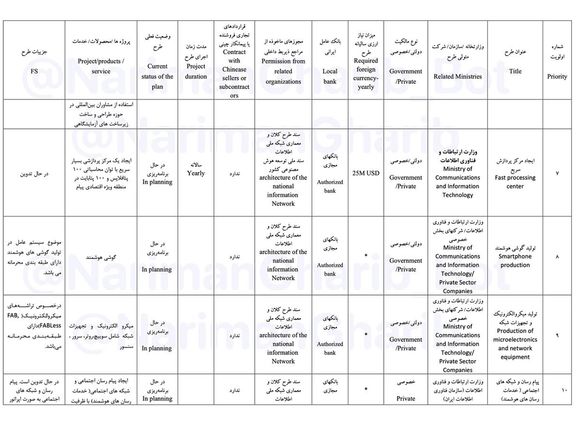Leaked Document Reveals Iran’s Multiple Telecom Deals With China

A whistleblower active in the IT industry has leaked documents revealing hundreds of millions of dollars' worth of telecommunications contracts between Iran and China.

A whistleblower active in the IT industry has leaked documents revealing hundreds of millions of dollars' worth of telecommunications contracts between Iran and China.
London-based Iranian-British internet security expert and cyber espionage investigator Nariman Gharib released a list of contracts signed between the Islamic Republic's Ministry of Information and Communications Technology and Chinese companies.
The secret document – which has no date and cannot be verified independently by Iran International -- contains a table of 10 contracts for various projects such as development of Iran’s landline network, infrastructure for fourth and fifth generation of broadband cellular networks and three satellite projects as well as production of smartphones and developing messenger services.
Feasibility studies for several of the projects have been carried out but some others are in the planning stages.
The project for the supply and operation of a geosynchronous telecommunication satellite is announced to be at $100 to $450 million for a 42-month project while another satellite project is valued at $300 million for a three-year project.

The project for landline development is worth $220 million while the project for the modernization of Telecommunication Company of Iran, or TCI -- the country’s main mobile service provider -- is $325 million followed by the modernization of MTN Irancell -- another telecommunications company -- at $250 million.
Each company will get 1,500 5G sites and 3,000 LTE networks, according to the contracts.
China’s large-scale effort to control and censor the Internet has become a viable conceptual and technical model for authoritarian regimes, like Iran's Islamic Republic. The Islamic Republic of Iran follows China’s lead in systematic oppression techniques.
China has combined legislative actions and technological enforcement to regulate the Internet domestically, calling it “The Great Firewall” of China.
Cybersecurity expert, Robert Potter, has said in a joint report, "China is known to be building a techno-surveillance authoritarian state domestically."
China’s second-largest telecom equipment maker, ZTE, sells to more than 500 carriers in more than 160 countries, 60 of which have questionable human rights records. In addition to selling services, China provides training programs that include subjects like ‘manipulating public opinion.’
According to a 2012 report by Reuters, China’s ZTE sold TCI a powerful surveillance system capable of monitoring landline, mobile and internet communications. The system was part of a 98.6-million-euro ($130.6 million) contract. Government-controlled TCI has a near monopoly on Iran’s landline telephone services and much of Iran’s internet traffic is required to flow through its network. The ZTE-TCI deal, signed in December 2010, illustrates how despite tightening global sanctions at the time, Iran still managed to obtain sophisticated technology, including systems that can be used to crack down on dissidents.
During a briefing at an annual security conference in Munich in 2020, United States’ officials warned that China will use Huawei’s presence in future communication networks to steal corporate secrets, censor content, and track dissidents. Critics of China say the rapid rise of these tech companies stems from the theft of intellectual property. Chinese tech giant Huawei has done business with North Korea, helped Iran spy on their citizens, and created ‘back doors’ for easier intellectual property theft.
As Washington stepped up pressure on the world's largest telecommunications equipment maker, the US Justice Department accused Huawei Technologies in February 2020 of helping the Islamic Republic track anti-government protesters. In September 2021, Huawei Technologies chief financial officer Meng Wanzhou admitted helping Huawei conceal dealings with the Iranian regime.